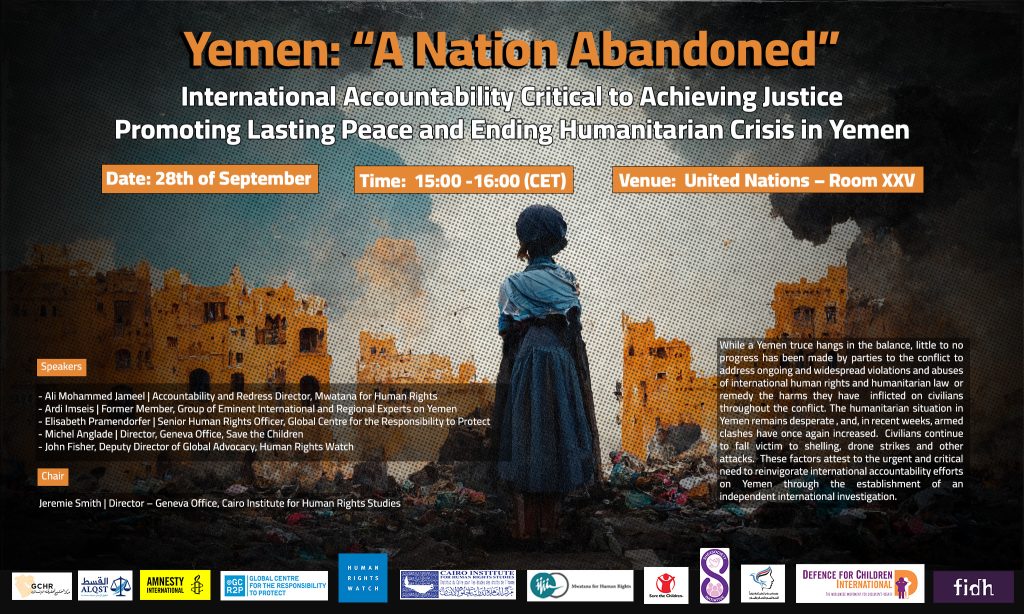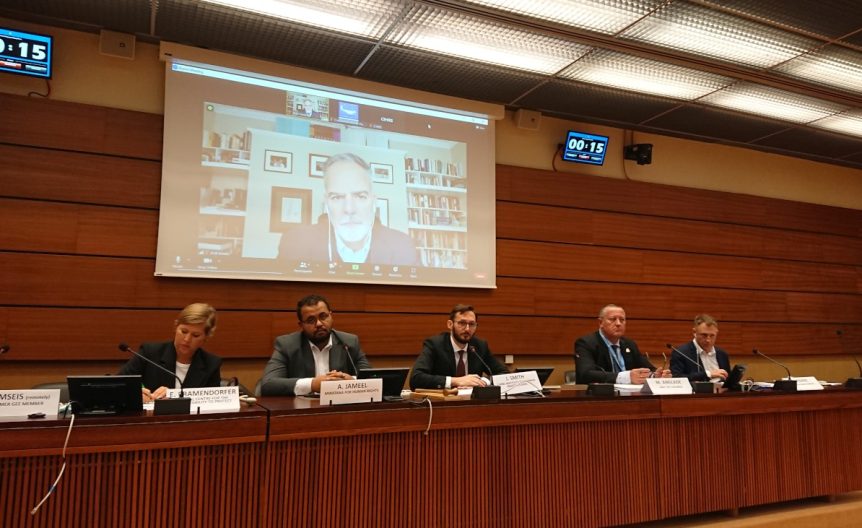The Cairo Institute for Human Rights Studies (CIHRS), in cooperation with eleven regional and international human rights organizations[1], organized a side event entitled “Yemen: An Abandoned Nation; International accountability Critical to Achieving Justice, Promoting Lasting Peace and Ending Humanitarian Crisis,” on 28 September, alongside the 51st session of the United Nations Human Rights Council (UN HRC). The webinar hosted Ardi Imseis, former member of the Group of Eminent Experts (GEE) on Yemen; Ali Mohamed Jameel, Director of the Accountability and Equity Program at Mwatana for Human Rights; John Fisher, Deputy Director of the International Advocacy Program at Human Rights Watch; Michel Anglade, Director of the Geneva Office of Save the Children International; and Elisabeth Pramendorfer, Senior Human Rights Officer at the Global Centre for the Responsibility to Protect. The session was moderated by Jeremie Smith, Director of the Geneva Office of CIHRS.

The participants unanimously agreed on the important role of Group of Eminent Experts in Yemen. The GEE was the only independent mechanism documenting violations committed by all parties to the conflict in Yemen, noted Ali Jameel, who explained that last year’s termination of the mandate created a gap in documentation and reporting in Yemen, a notable absence given that research is underway for Yemen’s Universal Periodic Review (UPR) submission to the Human Rights Council. The National Commission to Investigate Alleged Violations to Human rights in Yemen is not independent or impartial in any way, added Jameel, as it reports to the Presidential Council, which is a party to the conflict and some of its members are military leaders. This discourages victims from submitting their testimonies to the commission. Despite the announcement of the second armistice in Yemen, Mwatana Organization documented 280 grave violations, all of which were perpetrated with complete impunity.
Ardi Imseis considered the nonrenewal of the GEE’s mandate as a shameful stain on the conscience of the international community, and condemned the international community’s failure to replace it with an alternative mechanism amid the country’s worsening humanitarian crisis. In the absence of an independent international mechanism to document violations committed by all parties, Yemen can be considered a “zone free of international law.” Perpetrators of abuses remain in power without fear of accountability, rendering the fate of the Yemeni people uncertain amid a perilous situation in the country.
Elisabeth Pramendorfer pointed out that since the decision to end the GEE’s mandate, the number of civilian casualties has risen to a number not seen in Yemen in years. This significantly impacts the effectiveness of the Human Rights Council and United Nations as a whole, as it signals to other governments around the world that sufficient pressure can end international investigations and thus accountability for any violations they may commit against their people.
Michel Anglade discussed the impact of the Human Rights Council’s decision to dismantle the GEE on the lives of Yemenis, in particular on the lives of thousands of children. The lack of international accountability has caused the situation to deteriorate, with over 24 million people in need of humanitarian assistance, the majority of whom are women and children.
John Fisher considered the Human Rights Council to have failed the Yemeni people, with the parties to the conflict defeating the only independent mechanism in Yemen. The decision to dismantle the GEE was not due to the absence of a need for such mechanism, Fisher explained, but rather to avoid political pressure. Fisher emphasized that in the absence of serious political will, there would be no end to the suffering of the Yemeni people.
All participants emphasized the need to form an independent international investigative mechanism to monitor ongoing violations and abuses and hold those involved accountable. Jameel called on the international community not to abandon Yemen. Imseis explained that achieving sustainable peace with accountability can only be achieved by providing effective accountability measures to victims. Imseis called on the Human Rights Council to raise the case of Yemen to the International Criminal Court. Pramendorfer stressed that political will is of primary importance in saving Yemen, including the political will to form a new investigative mechanism to ensure accountability, and pave the way for effective redress. Anglade called on all parties to the conflict to abide by their international obligations and to protect civilians, especially children.
[1] Cairo Institute for Human Rights Studies, Gulf Center for Human Rights, ALQST for Human Rights, Amnesty International, Global Center for the Responsibility to Protect, Human Rights Watch, Mwatana for Human Rights, Save the Children International, Women 4 Yemen, Defence for Children International, Min Haqqi Foundation to Empower Women Politically and Economically.
Share this Post

